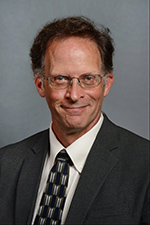Speakers: Timothy Haithcoat, PhD
 Timothy Haithcoat, PhD
Timothy Haithcoat, PhD
Assistant Teaching Professor: Geospatial Informatics
MU Institute for Data Science and Informatics
Data Science and Analytics Program
University of Missouri
Dr. Haithcoat has 38 years of experience integrating geospatial information technologies in both the research arena of the University and applied collaborative environments in support of the missions and mandates of the State of Missouri and Nation. In carrying out and administering these projects, he has developed broad expertise in image and spatial analysis, database design and construction, geoanalytics and modeling, as well as scholarly research, writing and evaluation. My applied research supports interdisciplinary objectives in such diverse areas as wildlife biology, broadband access, risk assessment, social and cultural mapping, and healthcare. His current research focuses on the continued development and expansion of the Geospatial Analytical Research Knowledgebase (GeoARK), a spatially enabled big database with information that is pre-processed, cleaned, integrated, and represented in a spatial context. The data includes demographic, environmental, infrastructure, cultural, physical, as well as geospatially derived layers (remoteness, isolation, accessibility, etc.).
Chasing Context: What Should We Know, How Can It Be Integrated
This presentation’s topic was prompted by my 38 years of geospatial database development, research, and geo-analysis. This includes the development of data clearinghouses and other centers focused on access to geospatial information. The problems found with data discovery and its availability is quite daunting. Tied to this is the growing realization of disparities in health and health care in the U.S. This was proven even more important during the recent COVID-19 pandemic. For us as a society to address these issues, we must bring the geographic context within which these health disparities exist to bear. Context is that missing, but integral component to today’s research. My research goal is to develop a robust environment for health researchers and practitioners to easily incorporate spatially integrated health, social, cultural, and environmental parameters within their own research using a scalable geospatially enabled database. The ability to do these assessments across ranges of geographic scales is paramount to success in understanding how we can mitigate, and at what geographic scale those mitigations can take place. We need to integrate location into our understanding of health-related problems and issues. Today’s questions are highly complex and require context!
